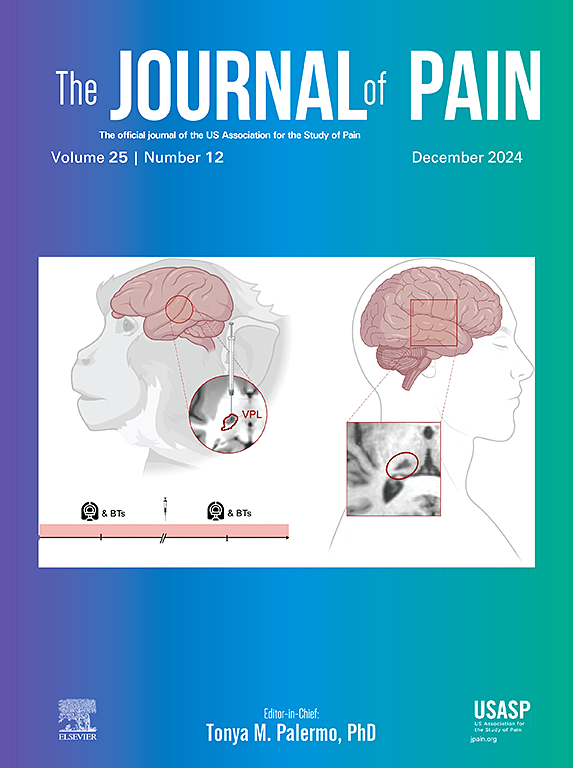Intersection of alcohol use, pain symptoms, and negative affect in total knee arthroplasty patients and people with HIV
IF 4
2区 医学
Q1 CLINICAL NEUROLOGY
引用次数: 0
Abstract
Alcohol is a well-known analgesic, although excessive alcohol use can lead to hyperalgesia and heightened negative affect. This cross-sectional study examined associations between alcohol use, self-reported pain, and negative affective symptoms in two distinct cohorts of patients vulnerable to chronic pain: individuals undergoing total knee arthroplasty (TKA) surgery and a cohort of people with HIV (PWH). Participants were enrolled in two clinical studies: a retrospective study of patients undergoing TKA and a longitudinal study of PWH, the New Orleans Alcohol Use in HIV (NOAH) cohort. Based on the Alcohol Use Disorders Identification Test – Consumption (AUDIT-C) score, participants in both cohorts were stratified as alcohol drinkers (AUDIT-C ≥ 1) or non-drinkers (AUDIT-C < 1). In the NOAH cohort, pain intensity and interference were assessed using the 36-Item Short Form Survey (SF-36). In the TKA cohort, self-reported pain was quantified using the Pain Intensity and Pain Interference items from the Patient-Reported Outcomes Measurement Information System® (PROMIS-29) and the Knee Osteoarthritis and Outcomes Score (KOOS) Pain scores. Alcohol drinkers reported fewer pain symptoms compared to non-drinkers across both cohorts, and females with HIV reported more pain compared to males with HIV. Furthermore, pain symptoms were associated with increased anxiety and depression symptoms in both cohorts, and in PWH these associations appeared stronger in drinkers compared to non-drinkers. These findings suggest that although alcohol may offer some analgesic benefits, patients should be cautioned about its use for self-medication, as it may increase risk for pain-related negative affective comorbidities.
Perspective
Alcohol can both relieve and exacerbate pain. The current study discovered that ongoing alcohol use was associated with fewer self-reported pain symptoms but appeared to increase associations between pain and negative affective symptoms in two vulnerable cohorts. Findings support cautioning patients against the recurring use of alcohol for pain management.
全膝关节置换术患者和HIV感染者中酒精使用、疼痛症状和负面影响的交叉关系
酒精是一种众所周知的镇痛药,尽管过量饮酒会导致痛觉过敏和负面影响加剧。本横断面研究在两组易患慢性疼痛的患者中检测了酒精使用、自我报告的疼痛和阴性情感症状之间的关系:接受全膝关节置换术(TKA)手术的个体和HIV感染者(PWH)队列。参与者参加了两项临床研究:一项是对接受TKA的患者的回顾性研究,另一项是对PWH的纵向研究,即新奥尔良艾滋病毒酒精使用(NOAH)队列。根据酒精使用障碍识别测试-消费(AUDIT-C)评分,两个队列的参与者被分层为饮酒者(AUDIT-C≥1)或非饮酒者(AUDIT-C <;1). 在NOAH队列中,使用36项简短问卷调查(SF-36)评估疼痛强度和干扰。在TKA队列中,使用患者报告结果测量信息系统®(允诺-29)的疼痛强度和疼痛干扰项以及膝关节骨关节炎和结果评分(oos)疼痛评分对自我报告的疼痛进行量化。在两个队列中,饮酒者报告的疼痛症状比不饮酒者少,感染艾滋病毒的女性报告的疼痛比感染艾滋病毒的男性多。此外,在两个队列中,疼痛症状与焦虑和抑郁症状的增加有关,在PWH中,饮酒者与不饮酒者相比,这些相关性更强。这些发现表明,尽管酒精可能提供一些镇痛效果,但患者应谨慎使用它进行自我治疗,因为它可能增加与疼痛相关的负面情感合并症的风险。酒精既能减轻疼痛,也能加剧疼痛。目前的研究发现,持续饮酒与自我报告的疼痛症状较少有关,但在两个易受伤害的队列中,似乎增加了疼痛和负面情感症状之间的联系。研究结果支持提醒患者不要反复使用酒精来控制疼痛。
本文章由计算机程序翻译,如有差异,请以英文原文为准。
求助全文
约1分钟内获得全文
求助全文
来源期刊

Journal of Pain
医学-临床神经学
CiteScore
6.30
自引率
7.50%
发文量
441
审稿时长
42 days
期刊介绍:
The Journal of Pain publishes original articles related to all aspects of pain, including clinical and basic research, patient care, education, and health policy. Articles selected for publication in the Journal are most commonly reports of original clinical research or reports of original basic research. In addition, invited critical reviews, including meta analyses of drugs for pain management, invited commentaries on reviews, and exceptional case studies are published in the Journal. The mission of the Journal is to improve the care of patients in pain by providing a forum for clinical researchers, basic scientists, clinicians, and other health professionals to publish original research.
 求助内容:
求助内容: 应助结果提醒方式:
应助结果提醒方式:


